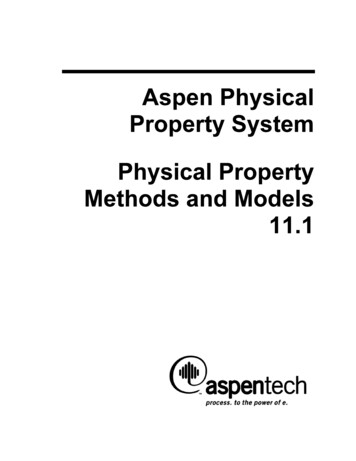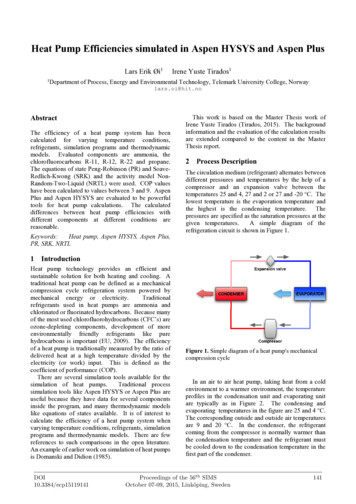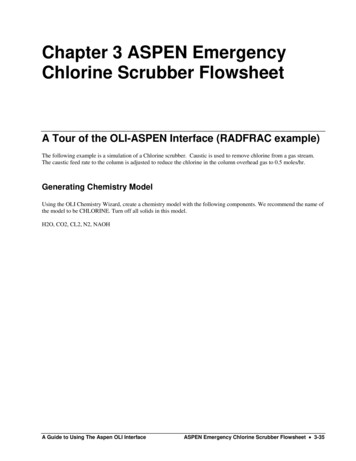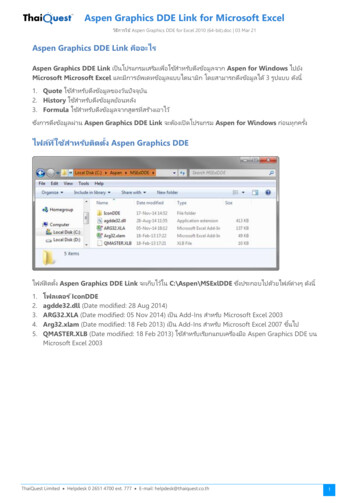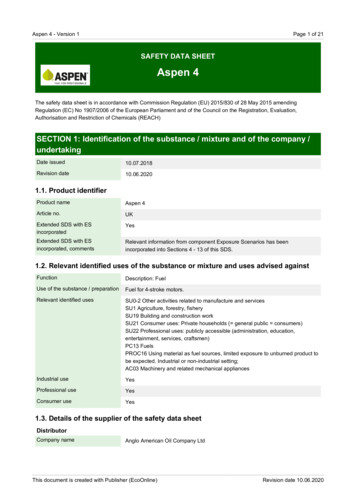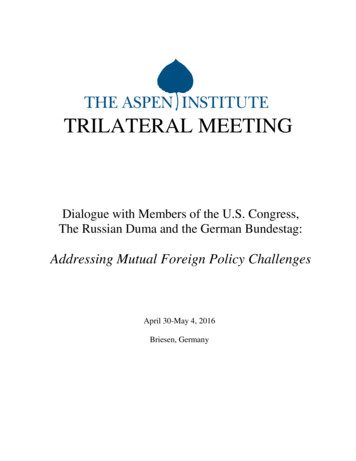
Transcription
TRILATERAL MEETINGDialogue with Members of the U.S. Congress,The Russian Duma and the German Bundestag:Addressing Mutual Foreign Policy ChallengesApril 30-May 4, 2016Briesen, Germany
TRILATERAL MEETINGDialogue with Members of the U.S. Congress,The Russian Duma and the German Bundestag:Addressing Mutual Foreign Policy ChallengesApril 30-May 4, 2016Vol. 31, No. 2Dan GlickmanVice President, Aspen InstituteExecutive Director, Congressional ProgramWashington, DC
This project was made possible by grants from the Carnegie Corporation of New York withsupplemental support from the Democracy Fund, the Ford Foundation, the William and FloraHewlett Foundation, the Holthues Family Trust, the Henry Luce Foundation, the John D. andCatherine T. MacArthur Foundation, Rockefeller Brothers Fund, and the RockefellerFoundation.Copyright @ 2016 by The Aspen InstituteThe Aspen InstituteOne Dupont Circle, NWWashington, DC 20036-1133Published in the United States of Americain 2016 by The Aspen InstituteAll rights reservedPrinted in the United States of AmericaISBN: 0-89843-648-6Pub # 16/011
Table of ContentsRapporteur’s Summary . 1Peter EitelUkraine’s Impasse: Beyond a Protracted Frozen Conflict, Searching for a Viable Security Structure . 9Sharyl CrossHelsinki Plus or Helsinki Minus? . 17Alexey GromykoReducing the Threat of Nuclear Weapons . 21Karl-Heinz KampReducing the Threat of Nuclear Weapons: The Status of the Iran Agreement and Multilateral Efforts toLimit the Spread of Nuclear Arms . 23Sergey RogovStrategic Priorities for NATO in the Security Environment of 2016 . 33Jeffrey A. LarsenStruggling for Islamic Alternative . 39Alexey MalashenkoConfronting Terrorism, Combatting ISIS, and Middle East Challenges . 43Joachim KrauseThe Challenge of the Islamic State: The Record and the Lessons . 47Rajan MenonCollaboration, As Far as Possible; Defense, As Far as Necessary. 53Karsten VoigtA Long View of Transatlantic Crises: Increasing closeness, increasing friction. 57Karsten VoigtGeorge F. Kennan, Containment, and the West’s Current Russia Problem. 63Matthew RojanskyThe U.S.-Russian ‘Value War’ . 75Nikolai ZlobinClosing the Gap by Looking to the Future . 79Mathew BurrowsConference Participants . 83Conference Agenda . 87
Rapporteur’s SummaryPeter EitelUniversity of Kiel PhD candidate;consultant to The Aspen Institute GermanyThe Aspen Institute Congressional Program incooperation with The Aspen Institute Germany held aconference in Briesen, Germany, May 1-4, 2016, titledDialogue with Members of the U.S. Congress, theRussian Duma and the Germany Bundestag: AddressingMutual Foreign Policy Challenges.Conferenceparticipants included 9 members of Congress, 7members of the Russian Duma, 2 members of Russia’sFederation Council, five members of the GermanBundestag, as well as xx American, Russian andGerman scholars on a number of U.S. policy issuesaffecting the U.S., Russia and Europe. A field visit wasalso made to the nearby Seelow Heights war memorialfor fallen Russian and German soldiers, where one ofthe major final battles of WWII took place. Thegathering was the first of its kind between American andRussian legislators since the beginning of sanctions in2014.Participants discussed the following topics indifferent sessions: the Minsk process and Europeansecurity; reducing the threat of nuclear weapons;confronting terrorism, combatting ISIS, and MiddleEast challenges; reconciling different Russian andWestern values and expectations; and long termprospects for US-Russian relations.The atmosphere of the meeting was characterizedby a certain choreography: Conversations often beganwith very detailed statements elaborating on who is toblame for the current situation. While differences inopinion and interpretation persisted throughout themeeting, it was observable that over time the focusshifted from flagging differences, to participantsincreasingly striving to identify commonalities inattempts to overcome controversial and hardenedpositions.The Minsk Process and European SecurityThe crisis and conflict in and around Ukrainepushed an already strained relationship between Russiaand the West into outright conflict in 2014. Ukraineremains at the heart of tension in relations today. Theongoing conflict in eastern Ukraine and the broaderpolitical crisis in which Ukraine finds itself aredestabilizing factors for the wider region, includingRussia and Germany.The conflict in Ukraine is at the heart of theconfrontation between Russia, the EU and NATO.Many participants expressed that resolving this conflictis a precondition to reaching a lasting European securityarchitecture. One participant argued that mistakes madeby the governments in Kiev, the West and Russia playedan important role in the developments that led to thecurrent situation. Kiev’s mistakes were the illegality ofassuming power; deploying military forces to theDonbas Region by the interim government of 2013; andconducting the military operation as an anti-terroroperation, thereby labelling the entire Donbaspopulation as terrorists. Mistakes attributed to the Westincluded breaking the agreement with the Ukrainiangovernment of February 24, 2014; supporting militaryoperations against Donbas; and blaming only Russia forthe crises, while neglecting the role of Ukraine.Russia’s mistakes included never adapting itspolicy towards Kiev; ignoring the necessity of utilizingsoft-power to counter anti-Russian sentiments; failing tointeract with Ukrainian civil society; and lacking ablediplomats in Kiev.1
Several experts noted that the implementation of theMinsk II agreement now largely depends on Ukrainiandomestic politics, where an intense fight for politicalpower is underway between various forces andstakeholders.Another participant offered a different analysis ofhow Germany, Russia, and the United States regard theconflict in Ukraine. While the U.S. looks at the conflictfrom the perspective of democratic self-determination,Russia views the situation in Ukraine as a direct threatto its sphere of influence and a challenge to its role inthe international arena. Germany feels directlythreatened by Russia’s renewed assertiveness, both interms of democratic self-determination as well as ofnational security considerations. At the core of theconflict there is a quest for mutual respect andrecognition.Regarding the Minsk II ceasefire agreement, oneparticipant argued that the goal of achieving a securityarchitecture in times of tensions should be the guidingprinciple for the core actors in their efforts to implementthe Minsk agreement.Several participants remarked on the importanceand unique character of this meeting, as nothing of thekind has occurred since 2013, and that discussing policydisagreements is a crucial step toward resolving thecrisis in Ukraine. While the end of the bipolar world didnot eliminate differences and disagreements betweenRussia, the United States, and its NATO allies, recentdevelopments in Ukraine have escalated the situationfrom disagreement to conflict. This conflict, whichemanated from a domestic conflict revolving aroundcorruption, has taken on a military dimension withhybrid forms of warfare, and a geopolitical dimension.While the Minsk agreement is a valuable platformfor establishing and reaffirming working trust and “trustin capabilities” between the partners, it is battlingagainst time. Several participants expressed concern thatthe window of opportunity for a successfulimplementation could close within the next three to fourmonths, as this summer may be the last opportunity toget the support of the Ukrainian people.According to this assessment, the currentgovernment in Kiev is rapidly losing support, and itsposition is contested by various elite groups. Thesituation is further complicated by the fact that theUnited States is currently focused on its presidentialrace; at the same time Germany and other EuropeanUnion member states also have little leverage regardingthe Ukrainian government. For it to be successful, the2government in Kiev plays an integral part. In Russia, onthe other hand, presidential elections are set forSeptember 2016, further adding to a stalemate regardingthe speedy implementation of the agreement.In order not to let the window of opportunity close,a roadmap for the resolution of the conflict wassuggested: The parties involved should exert theirleverage on the Ukrainian government to end violenceand establish meaningful control of the borders; conducta vote on the Donbas Region in the UkrainianParliament (the Rada), which would immediately triggera referendum in the Donbas region; exchange militaryconfrontation with efforts to rebuild the Donbas region;and return the migrant population and internallydisplaced persons.In the broader context, one expert argued that thekey challenge is to overcome the zero-sum gamebetween the European Union and the EurasianEconomic Union. Rather than regarding the zones asmutually exclusive, or seeking to keep them apart byallowing for grey zones of instability, the actorsinvolved should focus on increasing their economicinterdependence, and accept that a failure to agree onUkraine implies the end of a European securityarchitecture. In this regard, Russia and the West shouldaccept Kosovo and Crimea as exceptions and return tothe principles agreed on in the Helsinki Final Act of1975 which could pave the way to end the violence inUkraine.The ensuing discussion was characterized by anoften detailed exchange of different interpretations ofinternational law and the international legal system,particularly regarding the UN regulations on the use offorce and territorial integrity. In regard to Ukraine andthe Minsk II agreement, the focus on different readingsof each others’ respective roles both in causing and inresolving the situation prevailed. However, severalparticipants noted that the window of opportunity toresolve the crisis in Ukraine is closing very quickly, andthat no time ought to be lost by finger pointing.One participant identified the diverging narrativesas the key obstacle, which can only be overcome if theactors involved dare to engage in more diplomacy. At atime when the world is experiencing the most dangerousmoment since the end of the bipolar aggression, only areturn to diplomacy can mitigate the “wrong buttonthreat”. In this, the Organization for Security andCooperation in Europe could play a key role, both as asymbol that constructive diplomacy on a Europeansecurity architecture is possible, and as a multilateral
institution accepted by all partners.Former Russian leader Mikhail Gorbachev’s idea ofa “Common European Home” has collapsed over thequestion of Ukraine, one participant argued, due toshortcomings that led to diametrically opposednarratives both on behalf of NATO and of Russia.NATO, he argued, provoked Russia when in the midnineties NATO enlargement became a concern. NATOalso failed to build a second pillar of the Helsinki FinalAct by emphasizing increased cooperation ineconomics, technology, science, and the environment.In regard to Russia, its foreign policy has achieved theopposite of what it intended in Ukraine. While two yearsago Russian-Ukrainian relations were friendly, todaythe majority of the Ukrainian population views Russiaas a major threat. This situation is further aggravated byRussia’s failure to further pursue a path of societal,economical, cultural and ideological modernization.One participant provided policy recommendations:(1) Based on the reports of the OSCE observer missionin Ukraine that clearly indicate the majority of ceasefireviolations being caused by separatists, Russia shouldconsider allowing OSCE observers and monitors on theRussian side of the border; (2) While there are numeroustracks between Europe and Russia, the United States isless involved. However, there are several aspects inresolving the situation in Ukraine and beyond that callfor U.S. involvement. This participant pointed out theabsence of a highly visible summit between the Russianand U.S. president, and called upon the U.S. to call fora visible summit on the resolution of the Ukraine crises.Such a summit, he explained, would be of hugesymbolic value.Reducing the Threat of Nuclear WeaponsThe Iran nuclear agreement has been cited as atriumph of multilateral diplomacy, and as evidence thatcooperation among the world’s big powers, includingRussia and the West, remains possible despiteapparently deep disagreements in other areas. Yet trustamong the parties to the Iran nuclear deal remainsextremely low, a breakdown in implementation of theagreement from either or both sides remains verypossible, and politicians on all sides have spoken aboutmilitary action as a fallback in case the agreement fails.Renewed tensions between Russia and NATO overUkraine have led to a new nuclear age, where Russiaseeks to counterbalance NATOs conventional forcesuperiority by tactical nuclear weapons. Thisdevelopment means that relieving the nuclear threat willnot be achieved by arms reduction treaties alone. Evencooperative achievements like the deal with Iran cannotcover up the fact that today, the idea of non-proliferationis as dead as the idea of a nuclear weapon free world.Therefore, it is crucial that NATO and Russia re-engagein nuclear talks.There was a substantial reduction of nuclearweapons during the nineties, particularly on behalf ofRussia and the United States. However, there are stilltoo many nuclear weapons, particularly in thepossession of nations other than the United States andRussia. The common challenge for the United States andRussia is how to engage these other states owningnuclear weapons on non-proliferation in a multilateralworld. While Russia and the U.S. are still engaged innuclear exercises, it is clear however that strategicstability cannot be ensured by strategic nuclear weaponsanymore. Conventional weapons, cyber weapons, orother weapons all are capable of having strategic impact,a situation with which both the U.S. and Russia need tocope. In order to prevent a deepening of a new ColdWar, one expert proposed a Russian initiative rk first bilaterally with the United States, butalso within the NATO-Russia context. The U.S. shouldbe more open to dialogue and confidence buildingmeasures in respect to the missile defense systems.One participant observed that NATO is grappling tounderstand Russia’s current foreign policy rationale. Asa military alliance, it will react accordingly if there is anincrease in Russian troops on NATO’s borders, as longas Russia’s goals remain unclear. In relation todeterrence and NATO’s nuclear policy, there is anecessity to rebalance collective defense, deterrence,and out-of-area missions in light of recentdevelopments. Regarding proliferation, fissile materialsand their use by non-state actors to produce “dirtybombs” are a key concern for NATO.There are common strategic interests in engagingother nuclear weapon states such as China and Pakistanin nuclear arms reduction or preventing the use ofnuclear-enriched explosives by non-state actors,particularly ISIS. Participants often referred to exampleslike the recent deal with Iran on its nuclear program, orthe UN Security Council resolution to demolish Syria’schemical weapons stockpiles.In relation to recent air and seaborne incidentsbetween Russian and NATO forces, participantsidentified a need to review the existing regulations; theensuing negotiating process could also serve as an effortto re-establish working trust. In addition, the need to3
develop new confidence building measures betweenNATO and Russia was identified.Confronting Terrorism, Combatting ISIS, andMiddle East ChallengesDespite deep disagreements over Ukraine, Russiaand the West appear to share a common challenge inconfronting Islamic extremism originating in the MiddleEast and spreading into Europe and beyond, includingthe threat of violent terror attacks against civilians.Indeed, the acute challenge posed by ISIS may be avehicle for restoring productive dialogue andcooperation between Russia and the West.The threat ISIS poses is formidable: based onbarbaric brutality and a narrative that frames the Muslimworld as being under attack from outside forces, ISIShas gone far beyond merely being a terror group.Instead, the movement should be regarded as aphenomenon, one expert argued. It clearly strives forterritorial control, counts former Iraqi military andadministrative cadres among its leadership, and has anestimated 200,000 people actively supporting its cause.Three catalyzing effects that supported the quickgrowth and stark impact of ISIS were identified: (1) achange in U.S. policy towards Iraq after the initialsuccess; (2) the brutal repression of the Assad Regimeagainst street protesters and opposition; and (3) thesuppression of the Iraqi Sunni population under theMaliki government. An argument was made thatRussia’s uncritical support of the Assad Regime is themost important reason the West is suspicious of Russia’sSyria strategy.According to one participant, the question whetherthe conflict in Syria can be resolved depends on whetherthe conflicting parties are able to reach a power sharingagreement. The ideal solution of “one Syria under oneruler” is no longer realistic. Syria today, like the widerregion, is a patchwork of clans and territories, evokingthe impression of a big power struggle which may becompared to continental Europe during the Thirty YearsWar.Such an agreement is only feasible if Russia exertsits influence on Assad. The conjecture was made that aslong as Russia supports Assad cooperation on thequestion of Syria and the Middle East between the Westand Russia unlikely.Another participant argued that defeating ISISwould only eliminate the tip of the iceberg, since thecreation of an Islamic State or caliphate is inherent inthe Muslim faith since Mohammed’s founding of a4Muslim state. The Koran lays out all the answers on howa Muslim state should look, and therefore, the utopia ofa Muslim state is so deeply rooted that the world oughtto come to terms with the existence of phenomenon likeISIS.Based on this assumption, four pertinent questionswere posed: (1) Whom are we fighting against?; (2) whoare we fighting with?; (3) how do we want to fightthem?; and (4) what can be offered to the Muslimpopulation? The answers to these questions are furthercomplicated by the fact that within the Muslim worldthere is conflict between Muslims on the best wayforward in establishing a Muslim state. While themoderate factions have a long-term perspective, andbase their actions within a legal framework, the catalystshave a medium term perspective and consider actionslike mass-protests and social unrest as appropriateinstruments in order to establish an Islamic State.Finally, the radicals, such as ISIS, have a short termperspective, and consider barbaric violence and militaryaction the fastest way to fulfil the utopia of an IslamicState.The observation was made that the world is in for along battle against Islamic fundamentalism, and thatattempts to establish an Islamic state will occur in manygeographical areas in the future.Another perspective was put forth that focused onthe regional complexities of the wider Middle East. Inthis view, the conflicts in Iraq, Syria, Libya, andSomalia are intertwined, and urgently require politicalsettlement. While Iraq, Libya, and Somalia have beenthe locus for international interventions, Syria quicklybecame an internationalized conflict after the massiveretaliation of the Assad Regime against the streetprotesters in 2012.Regarding a possible way ahead in Syria, oneparticipant forecasted that while resolving the conflictwith Syria’s original borders remaining intact would bedesirable, this would be highly unlikely. In seeking aresolution, he noted that Assad’s biggest competitor forpower is a group known as Jesh al-Islam, a secular, yetnot moderate opposition force. Russian airstrikes havefocused on attacking Jesh al-Islam strongholds,particularly because of their control of a coastal strip inNorthern Syria. From the perspective of Western liberaldemocracies, neither the domestic conflict nor Islamicfundamentalism ought to be considered a strategicthreat. However, terror attacks against metropolitancenters like Berlin, Moscow or Washington would needto be prevented at all cost.
The following discussion was characterized by anatmosphere that was notably more constructive than inthe previous sessions. Participants quickly voiced theirrejection of the idea to accept a mindset that is barbaricand uncivilized. Russia and the West face a commonenemy in ISIS, which challenges core principles of theWestphalian system, the enlightenment, and modernity.History shows, it was proposed, that Russia and theWest are highly capable of building an alliance againsta common threat.Much attention was paid to the question of how todeal with Syrian leader Bashar al-Assad. While themajority argued that fighting ISIS and Islamicfundamentalism should be the number one priority,others maintained that no power sharing agreement inSyria is possible with Assad staying in power, and thatthe question of how to deal with Assad should be the toppriority in resolving the situation in Syria. Othersinsisted that it should also be considered how theconflict in Syria could be resolved with Assad as part ofthe solution.Participants also cautioned to take regional andreligious dynamics into consideration when striving toend the conflict in Syria and the wider Middle East. Theposition was voiced that a solution in Syria would beunlikely without a stable Iraq. Others expressed the viewthat any solution in Syria needs to create an environmentin which Sunni and Shia groups can co-exist. In thisrespect, the conflict between Iran and Saudi-Arabia forregional hegemony has to be taken into consideration.Some participants argued that joining forces in thefight against ISIS would require the joint developmentof a United Nations Security Council resolution that isaccepted by regional players in the Middle East.However, in order to effectively fight ISIS, it would benecessary to have “boots on the ground” in Syria. At thispoint of the discussion, many participants argued thatthis is one of the biggest challenges, as no group orcountry can be identified that is willing to partner withthe international community on this project. Someparticipants argued that as much territorial integrity aspossible should be ensured, while Assad’s role shouldbe limited to a constructive role in a transitionalgovernment. After a transition period, power should betransferred to moderate forces after constitutionalchanges and a free and fair election. Others saw adissolution of the Syrian territory into three parts morelikely, divided among Assad and the Syrian Army,Kurds and Sunnis, and Shia forces.Reconciling different Russian and Western Valuesand Perceptions: Lessons to be Learned from theUkraine CrisisDisagreements between Russians and Westernersoften turn disparate perceptions of the very same events,which arguably is proof of a deep “values gap” betweenRussia and the West. Yet after the fall of the SovietUnion, Russia rejected communism and embraced thesame basic principles and forms of the free market anddemocratic government which the West advocated andpracticed. The annexation of Crimea has stopped thisintegrational process. And many of the current problemsare related with the crisis around Ukraine and RussiaWest relations are now attributed to disputes over“values” issues: human rights, corruption, rule of law,sovereignty, and individual freedoms as well as nationalself-determination, among many others.A question was put forth as to whether valuesactually matter in international relations. Thisproposition was highly controversial: For example,while it is possible to detach values from technicalissues like arms control, it is next to impossible in thecase of fighting terrorism, as captured in the phrase “oneman’s terrorist is another man’s freedom fighter.”Weighing options for future cooperation,particularly between Europe and Russia, the idea of acommon European house should not be forgotten.However, the current anti-NATO, anti-U.S. and anti EUsentiment is not only virulent among the Russianpopulation, but among populations in Europe, includingin Germany, Austria or Poland, it is fostered by populistmovements, reducing the likelihood of achieving thisgoal.All these neighboring nations are bound by thevalues and principles that are derived from the idea of acommon European house, freedom of choice, and theidea of limited devolution of sovereignty to theEuropean Union. These principles, it was argued, havebeen attacked by Russia and populist movementsstriving to undermine the European idea. Bothdevelopments have resulted in a strong response byGermany on a political and financial level. Also, thisexplains why Germany at times takes a tougher stanceon Russia than the U.S. Referencing the question ofUkraine’s accession to the European Union, it wasargued that the freedom of choice is a core principle ofthe European idea, and sacrificing this principle due toexternal pressure would mean giving up Europeanidentity. Moreover, Europe and the EU will never allow5
Russia to have a veto on the question of accession to theEuropean Union.Another participant argued that the litmus test forthe relationship between Russia and the West is whetherboth sides are willing to listen to each other closelyenough so that they are able to comprehend and repeateach other’s narrative in a way that each side wouldrecognize its narrative when repeated by the other side.The notion of a new Cold War was brought up. Here,evidence is mixed. Similar to the Cold War, today’srelations between the West and Russia are characterizedby aggressive “they and us” rhetoric as well as the useof propaganda; mutual isolation by establishingsanctions and military proxy-conflicts includingUkraine, Syria, or Georgia, and non-military proxyconflicts in parts of central and Eastern Europe. Unlikeduring the Cold War, Russia and the West today canlook back to 25 years of peaceful co-existence, whichinclude fundamental technological developmentsparticularly in the field of communications, that couldmake reconciliation over the question of Ukraine easier.In addition, one participant pointed out a structuraldifference that distinguishes today from the era of theCold War: While during the Cold War there existed twosuperpowers, today there remains only one superpower:the U.S. The position of the sole superpower, thespeaker continued, makes compromising much moredifficult for the U.S. As the sole superpower, there is noneed to compromise, as all others have to comply withits demands. Russia is showing no inclination to complywith the U.S. and demands eye-to eye-level treatment.Current issues, ranging from Ukraine to the conflict inSyria to the battle against religious fundamentalism,require both sides to compromise and to carefully listento each other.Another participant also refused to call today’ssituation a new Cold War. However, while the tensionsduring the Cold War were much more severe, both sidesshared an understanding of how to deal with each other.This has rapidly vanished, and Russia and the West needto develop new ways of coping with each other andfinding new ways of managing their relationship. In thisrespect, raising the issue of a clash of values is nothelpful.It was observed that Russia and the post-Sovietspace are currently in a highly fragile transitional period,which may well entail further territorial changes.Moreover, at the same time, the world order oncecharacterized by bipolar stability is undergoingfundamental changes. In this fluid and complex6environment at the beginning of the 21st century, boththe U.S. and Russia need to assess the developing powerdynamics and changes, and evaluate their interestsrather than their values. In this regard both sides arefacing fundamental questions: what do Russia and theWest want from each other?, and how can Russia andthe West both contribute to a new world order? Theexpert hinted that in his view that answer should notinclude the integration of Russia into the Westerncommunity of values or for Russia to adopt Westernmodels of governance (particularly the notion of sharingsovereignty). He urged the parties involved not only tospeak with each other about third parties, but to dare tospeak with each other to develop joint answers to thequestions mentioned above.Many participants rejected the idea of a new ColdWar. However, overemphasiz
University of Kiel PhD candidate; consultant to The Aspen Institute Germany The Aspen Institute Congressional Program in cooperation with The Aspen Institute Germany held a conference in Briesen, Germany, May 1-4, 2016, titled Dialogue with Members of the U.S. Congress, the Russian Duma and the Germany Bundestag: Addressing


